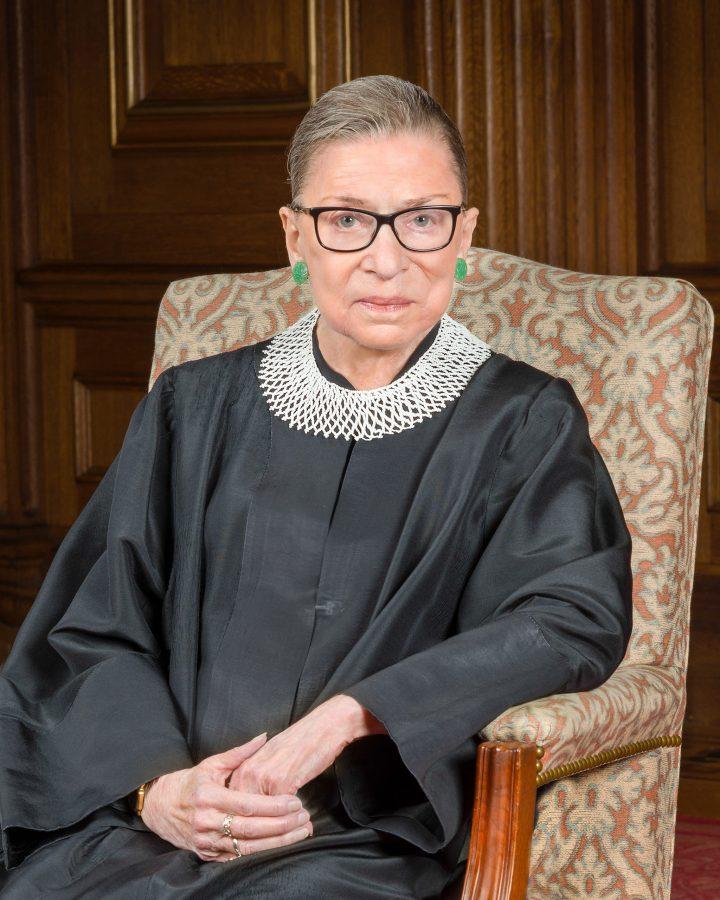Notorious: The life and legacy of Ruth Bader Ginsburg
This photo is of the Supreme Court Justice Ruth Bader Ginsburg as she served on the Court. She was the second woman ever to be on the Supreme Court. (Photo courtesy of Wikipedia/via https://en.wikipedia.org/wiki/Ruth_Bader_Ginsburg)
November 13, 2020
Social Studies teacher Brooke Oels was watching television with her husband in their Pennsylvania home when she felt her phone buzz. Her eyes gaped at the message from her friend and felt her gut churning when she opened the news app.
Supreme Court Justice Ruth Bader Ginsburg passed after battling cancer away on Sept. 18, 2020.
“I was devastated, worried and fearful all at the same time,” Oels said. “I have a group chat with a few friends, and her passing was pretty much the bulk of our conversation for the next couple days.”
Later that night, a former Global Perspectives student of Oels’ emailed her to check-in; the student remembered, as most of Oels’ students do, that Oels felt a particular connection to Justice Ginsburg.
“I had heard a few years ago that scientists believe the first person who will live to be 150 is already alive today,” Oels said. “I was hoping it would be her, but I guess not.”
It pained Oels to know that one of Ginsburg’s final wishes was not to be replaced until the next presidential election. As someone who studies politics, Oels knew that wish was unlikely to be granted.
Oels is far from the only person to have felt the pang of grief after getting a text or notification on that chilly September evening. Junior Morgan Switsky, for example, took to social media to remind her peers of the influence that Ginsburg had in America.
“What I admire most about RBG is her perseverance,” Switsky said. “She got so much hate and backlash, but never changed her views. She battled cancer and was way past the age of retirement and still would not back down.”
Ginsburg was born into a lower-class family in Brooklyn, New York. Her educational journey began at Cornell University, after which she attended Harvard University and Columbia University. When she attended Harvard, she was but one of nine women in her class, and the only female to be featured in the Harvard Law Review.
“I think she was a trailblazer, of course,” social studies teacher Erin Sassaman said. “Just coming from the time in which it was uncommon for women to be involved in law at all, let alone the top of their classes would be enough. But to go on and serve with distinction, getting more forceful as she settled in on the Supreme Court is definitely why I have always found her intriguing.”
During her time at Harvard, Ginsburg’s husband, Martin Ginsburg, was diagnosed with cancer while still attending law school there. Instead of dropping out or taking time away from his classes, Ginsburg decided to help him pass all of his classes with the help of a few other students who took his notes. After all of this, Martin recovered and was able to return to school. Ginsburg then grew her family, having two kids, four grandchildren and one great-grandchild.
“She serves as an example that one doesn’t have to give up family and love and that area of one’s life in order to dominate professionally,” Sassaman said. “She got married, had children who had grandchildren. And she did not shrink away from her convictions. In the area of women’s rights and reproductive rights, she fought to keep them a topic worth discussing and fought to keep them intact as others have sought to chip away at both.”
Nicknamed “the notorious RBG,” Ginsburg was a feminist trailblazer and an inspiration for many. A second-year NYU Law student coined the nickname following the Shelby County v. Holder decision, a landmark Supreme Court decision regarding the constitutionality of two provisions of the Voting Rights Act of 1965. For this case, Ginsburg famously wrote a scathing dissent, opposing Chief Justice John Roberts.
“Putting it in a school-friendly way, she basically gave Roberts and the majority the middle finger,” Oels said. “But she did it in such an eloquent and educated way for arguing for rights for, in that case… voting rights for everyone […]. She would never back down,” Oels said.
Ginsburg was an integral part of many historic Supreme Court cases in her time, arguably the most iconic being Obergefell v. Hodges, which was a massive step for couples in same-sex relationships and the LGTBTQIA+ community as a whole. Another was the United States v. Virginia, a milestone for women’s rights.
“I [admired] the steps forward that she made the how she was willing to fight, not only as a lawyer with helping especially women, in particular, get certain rights like being able to own a house or have a credit card without having permission from a man,” Oels said.
The question remains: what will Ginsburg’s legacy be? Will it lie in her dissents? Will it lie in her work ethic and drive? Or, will it lie in the hearts of the people she touched during her time as a Supreme Court Justice?
“[I hope her legacy is] that you can create your own space in a world that doesn’t seem to have one carved out for you already,” Sassaman said. “We know that representation matters. She didn’t have that in the way that girls now can say, ‘Oh, I can sit on the Supreme Court one day.’ She didn’t have it, but she became it. And so I think the legacy of not having to give up one aspect of life in order to have another and also being willing to evolve and change but also honor your convictions.”




